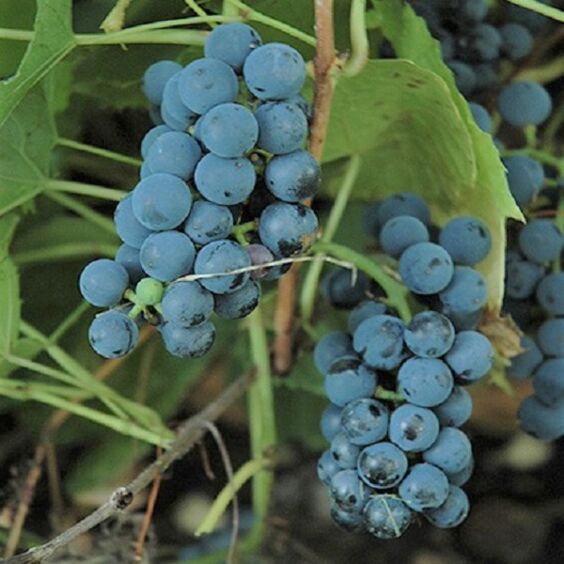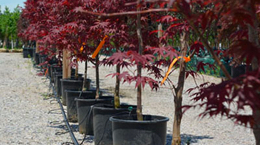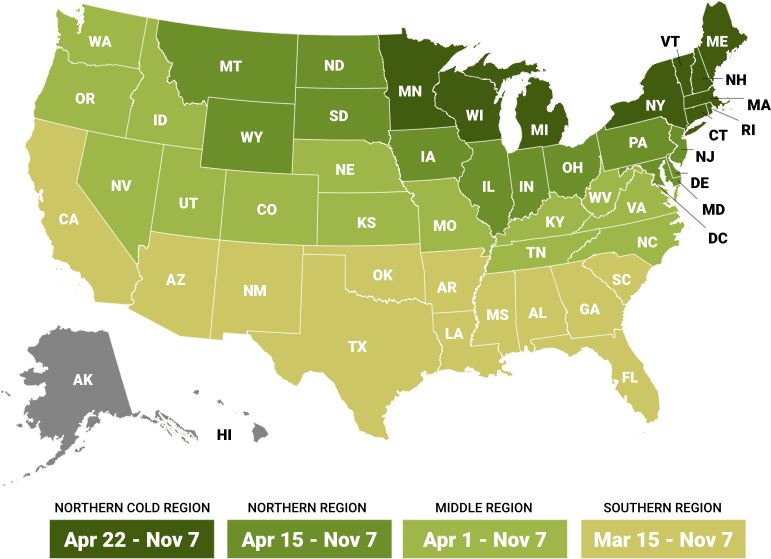
Growing zones
See Zone Map >Status: Out of stock
- Sun
Mature Plant Size (H x W): varies
Bloom Season: Spring
- Attracts Bees
- Attracts Birds
- Walnut Toxicity Resistant
- Edible to People
- Attracts Butterflies
Planting & Care for Edible Plants – Valiant Grape
Preparation
- Valiant Grapes produce medium sized fruit on well-filled 4"" clusters.
- This grape's flavor is rich and tangy with a beautiful blue color.
- It can be enjoyed for table use, juices and wines.
- This variety of grape was developed by South Dakota State University, bred especially for Northern Growers.
- This may produce grapes the first year after planting.
- Ripens late August to mid- September.
- Hardiness zone 3.
- Full sun is important to provide the heat required to ripen the fruit.
- Virtually any type of support structure will do, provided it is sturdy. Grape vines grow quickly and get quite heavy.
- Spring planting is recommended to give the young vines the most time to get established before their first winter.
- Each vine needs about 6 feet of space.
- To harvest, clip full clusters off the vine with pruning shears or heavy scissors. Handle clusters carefully; remove any discolored, injured, or undesirable berries; and then cool them as soon as they are picked. Storing grapes in a refrigerator is preferable to a cellar or other cool place where temperatures fluctuate.
- Plants will arrive as dormant, bare root plants. When you receive the plants, keep them in a cool place with the root system moist. You should plant these vines as soon as possible.
- Flowers are self-fertile and pollinated by wind and insects.
- Flowers are initiated on young canes. It is possible to get fruit one year after planting.
- The first two or three years, each early spring, apply compost around the base of the vines.
Opening Plant Material
- Bare Root - Cut open the bundle (top and roots are tied) and separate all the plants. Soak roots in buckets of water until planted. Each plant type will be labeled separately for identification. Do not expose the roots to sun. They should never dry out. Keep roots covered. All bare-root plants must be trimmed when planted.
Planting Bare Root
- You can plant in April or May (as soon as the ground can be worked).
- Soak roots in water overnight before planting, if possible. (at least 3-4 hours is recommended)
- Dig a broad and deep hole so roots fit comfortably.
- Place plant in hole so top of graft stem is at ground level.
- Back-fill with soil spreading out roots and covering the top of the graft stem.
- Mulching is not usually recommended for grapes because mulch will moderate the soil temperature, often keeping it cooler in warmer months, and grape vines grow best in warmer soil.
- Cut tops to 4-6"" in length.
- Click the link below “Handling & Planting Guideline” to see illustrations on planting bare root.
Pruning – After Planting
- After planting, be sure to prune the bare-root tops back to about 4-6 inches in length. Do not skip this step! It is a crucial factor in encouraging the roots to send up new growth during the growing season.
Pruning - Through-out the Season
- Prune in spring before leaves emerge. Vines can be trained to many decorative forms.
- Remember, flowers and fruit are located on buds that developed the previous year. Therefore you need to encourage new growth, but not too much.
- Annual pruning is very important to keep this type of growth healthy and rejuvenating each year.
- Year one - Depending on the size of the vine that you buy, prune the vine back to one straight cane. Tie this cane to a stake or to the fence and encourage it to grow straight. Remove any buds that start to grow lower on the trunk. This will make managing the vine much easier.
- After year one - Once the trunk has reached as high as you want, and the lateral trunks have been formed, prune the vine each spring before growth begins so the developing canes have enough air movement around them to reduce diseases.
Watering - After Planting
- After planting, water the vines regularly throughout the first year. The root system needs to grow and establish to allow for shoot growth in the first year.
- The best way to do this is to let your garden hose trickle slowly near the base of the plant. This gives the water a chance to soak in instead of running off. You can also use a soaker hose to water several plants at once.
Watering - Through-out the Season
- Water newly planted crowns, and keep soil moist throughout the growing season.
- How do you know if your plants need water? The easiest way to tell is to touch the soil around the roots. If it is moist, there is no need to water. If it is dry, give it a good soaking with the hose end (no nozzle) watering the soil only, not the leaves.
- Stick your finger into the soil around 3” to check soil moisture.
Planting & Handling Help
Download our Planting and Handling Guide below to plan for a successful arrival and install of your plants. Be sure to water all plants as soon as they arrive and every day until you’re ready to plant. Keep any bare root bundles in a shady, cool spot with the roots covered at all times.


Learn More
Watch our videos on handling bare root plants, how your order is prepared for shipment and more.


Plant Sizing
What is the difference between Containers, Grow Bags, Bare Root, and Balled & Burlap (B&B)?
Shipping Times


Our FedEx and local shipping times depend on two factors, one is by the region and the second is the type of product being shipped. For example, small fruits are only shipped in spring, but majority of our perennials are shipped from spring until fall. Keep in mind the dates below act as a general guide. Due to unpredictable weather, staffing, inventory and industry demands these timelines can change. Therefore, we cannot guarantee any of these times.
Shipping Dates by Region*
Northern Cold Region: April 22nd - November 7th
Northern Region: April 15th - November 7th
Middle Region: April 1st - November 7th
Southern Region: March 15th - November 7th
Local Delivery (small radius from Waterloo, WI): April 22nd - November 7th
Shipping Dates by Season*
Spring Shipping: Region Start Date (above) - May
Fall Shipping: September - November
Due to unpredictable weather, these times may vary. Some varieties are exceptions due to heat and plant health reasons. Enter your shipping zip code at the top of this page and be sure to check the shipping information on each product before you add it to your cart. If the product is too large or restricted in your state, you will not be able to checkout with that item in your cart.
